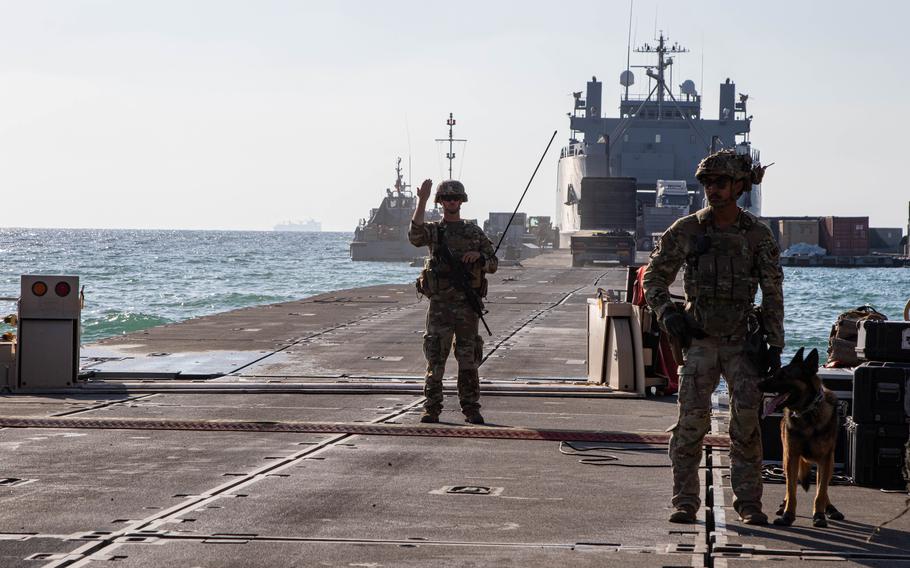
A U.S. soldier directs traffic across the pier and onto an Army vessel on June 22, 2024. The temporary pier, part of the Joint Logistics Over-the-Shore capability, was used to deliver humanitarian aid to Gaza. (Malcolm Cohens-Ashley/U.S. Army)
WASHINGTON — The U.S. military pier used off the coast of Gaza intermittently during the last few months to transport humanitarian aid into the war-torn enclave will cease to operate, the Pentagon announced Wednesday.
“The temporary pier has achieved its intended effect. Now that that maritime surge mission was successful, it’s now transitioning from a temporary pier in Gaza to a port in Ashdod, Israel,” said Vice Adm. Brad Cooper, deputy commander of U.S. Central Command, which oversees military operations in the Middle East.
As the humanitarian mission shifts, Cooper said the new hybrid method of delivering aid from Cyprus to the port of Ashdod to North Gaza has been utilized for the past few weeks. He said more than 1 million pounds of aid was delivered into Gaza through this route in the last several weeks.
The floating pier — known as Joint Logistics Over-the-Shore, or JLOTS — was meant to provide another way to deliver needed aid into Gaza. Health officials have warned for months that millions of Gazans face extreme hunger as Israel continues its war against the Hamas militants who launched a surprise assault in October from the enclave.
The JLOTS operation was first announced March 7 during President Joe Biden’s State of the Union address. The following day, Air Force Maj. Gen. Pat Ryder, the top Pentagon spokesman, said the temporary pier would be operational within about 60 days.
But poor weather conditions and concerns about onshore security plagued the operation.
The pier has been at the port of Ashdod since it was removed at the end of June due to bad weather.
Aid operations using the pier began May 17, but the Pentagon announced less than two weeks later that it would be removed for repairs after suffering damage from rough seas and bad weather. It became operational again June 7. Cooper told reporters at the time that the issue with the pier was “solely from unanticipated weather.”
A week later, CENTCOM again announced the pier was being temporarily removed due to high seas. It was reattached June 19 before being removed for the final time.
Security concerns also disrupted the distribution of aid. The United Nations suspended deliveries from the pier on June 9, a day after the Israeli military used the area around it for airlifts after a hostage rescue that killed more than 270 Palestinians. U.S. and Israeli officials said no part of the pier was used in the raid. However, U.N. officials said any perception in Gaza that the project was used might endanger aid work, The Associated Press reported.
As a result, aid transported onto the beach using the pier piled up for days. The World Food Program recently hired a contractor to move the aid from the beach to prevent the food and other supplies from spoiling, according to the AP.
The pier was only operational for about 20 days, military officials have said. About 1,000 American troops were involved in the effort. Three service members were injured during the operation, with one soldier being transported from Israel to Brooke Army Medical Center in San Antonio last month in critical condition. Cooper said Wednesday that the soldier is no longer in critical condition but remains in the hospital.
The Pentagon originally determined the pier would cost $320 million but defense officials later dropped the estimate to about $230 million. Pentagon spokeswoman Sabrina Singh had said lower-than-expected costs for contracted trucks, drivers and commercial vessels, and the United Kingdom’s contribution of a vessel lowered the U.S. price tag by about $90 million.
Sen. Roger Wicker of Mississippi, the top Republican on the Senate Armed Services Committee, has been a vocal critic of the operation.
“While I am glad it has finally concluded, we cannot buy back the $230 million needlessly spent, and significant questions remain about the Biden administration’s poor planning for this mission,” Wicker said in a statement.
Cooper said the military expects to save another $20 million, but he would not say from where the reduction would come.